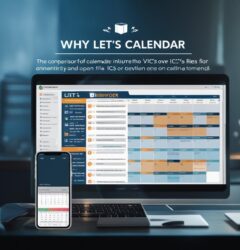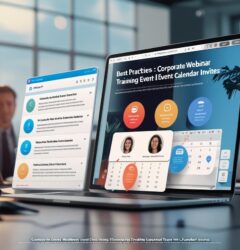- Email: [email protected]
- phone: +44 (0) 203 916 5117
03 Jun

In the world of large-scale webinars, high-stakes conferences, and recurring client meetings, calendar invites are a critical touchpoint between organizers and attendees for sending ICS File. Yet, many organizations still rely on outdated or manual methods to manage schedules. These methods are not only time-consuming, but they often lead to missed appointments, poor attendance, and communication breakdowns.
Event professionals, from CXOs to marketing teams and webinar ops, need more than just a calendar tool. They need a robust, automated system that can send bulk invites with precision and personalization. That’s where the iCalendar format—commonly used via .ics files—enters the picture. And that’s where Let’s Calendar (www.letscalendar.com) shines as a leader in event automation.
What is an ICS File? Understanding the iCalendar (.ics) File Format
Let’s start with the basics: what is an ICS file? An ICS file is a plain-text file that follows the iCalendar standard and is used for sharing calendar event information. These files contain critical event data such as title, time, location, duration, and attendee information.
The icalendar format is universally accepted across calendar applications including Google Calendar, Apple Calendar, and Microsoft Outlook. This cross-platform compatibility makes the ics file format a preferred method for sharing meeting schedules and event details.
Each ICS file includes data in a structured way, making it easy to parse and automate using software tools. It’s lightweight, standardized, and supports complex calendar data like recurring meetings and time zone details.
Why ICS Format Is Essential for Professional Events
The ics format is more than just a file type; it’s an industry-standard mechanism for automating time-sensitive communication. It’s particularly crucial for professionals running high-volume events where managing hundreds or thousands of invites manually would be infeasible.
For example, imagine running a multi-session conference with regional and global attendees. Sending out manual invites via email simply won’t scale. The ical ics format enables integration into CRMs, marketing automation tools, and event platforms, helping you maintain accuracy and efficiency.
Whether it’s webinars, town halls, or sales demos, having the right format is key to engagement. And the what is ics calendar capability unlocks real-time updates, reducing scheduling errors and confusion.
Using ICS Calendar Files to Schedule Events at Scale
ICS files are designed for automation and scale. Whether you are sending out calendar invites for internal meetings or external events, they offer a scalable structure. Each ICS file can be dynamically generated for a specific recipient—making mass distribution feel like a one-to-one experience.
When you need to set up recurring meetings, using format ics gives you the flexibility to specify repeat patterns (daily, weekly, monthly) along with time zones and reminders. This is especially valuable for recurring webinars or coaching sessions.
The ics calendar file format is fully supported by all major calendar apps, which means your attendees don’t need to install any special software to add your event. And for event ops teams, this translates to fewer support requests and more engagement.
Step-by-Step: How to Add Calendar to Event Using ICS Files
One of the most common actions taken by event registrants is clicking an “Add to Calendar” button. Here’s how ICS files power that functionality across platforms:
Google Calendar
- Generate your .ics file with event details
- Host it on a public URL or attach it to your email
- Users click "Add Event to Calendar" and the file is imported seamlessly
Outlook Calendar
- .ics files can be directly imported or opened via email
- One-click confirmation adds the event to the user’s calendar
Apple Calendar
- Automatically opens .ics attachments and asks for confirmation
- Integrates well with iOS and macOS reminders
Keywords like addevent, add calendar, and add to event enhance the user experience by giving attendees direct, actionable steps to save the event.
Personalization & 1:1 Communication Through ICS with Let’s Calendar
Let’s Calendar takes ICS automation to the next level. While many tools offer basic .ics generation, Let’s Calendar adds personalization layers to each invite. Each calendar invite with ical file can contain user-specific data such as their session choice, personalized Zoom link, or region-specific timing.
This personalization drives higher engagement and drastically reduces no-shows. The platform also supports discreet, one-on-one calendar communication—ideal for CXO-level roundtables or confidential board meetings.
With personalized calendar invites, your brand not only shows professionalism but also builds trust with every interaction.
Real-World Use Cases for Webinars, Conferences & Client Meetings
Let’s Calendar is trusted by marketing teams, event ops, and leadership teams to manage complex scheduling across formats:
Zoom Meeting & Webinar Automation:
Create recurring meeting invite at scale with full automation, ensuring invitees receive the correct session links and reminders.
Conferences & Summits:
Support thousands of attendees with localized ICS files containing personal agendas.
Client Meetings:
Discreetly send one-on-one invites that appear professional and are fully integrated into their native calendars.
Whether it's a zoom meeting or a zoom webinar, Let’s Calendar allows you to take control of every touchpoint.
Conclusion: The Future of Event Automation with ICS and Let’s Calendar
ICS files are the backbone of modern event automation. They provide a consistent, reliable way to send structured event data to any calendar platform.
Let’s Calendar combines the power of ICS with personalization, scale, and automation—helping organizations of all sizes streamline their event communications. From CXOs sending confidential invites to webinar ops managing thousands of attendees, Let’s Calendar is the modern choice.
Call to Action: Try Let’s Calendar Today
Ready to streamline your event scheduling? Try Let’s Calendar at www.letscalendar.com. Start automating recurring meetings, personalizing invites, and delivering professional calendar experiences at scale.
Simplify your workflow. Improve attendance. Impress your audience.
Let’s Calendar makes it possible.









Recent Comments